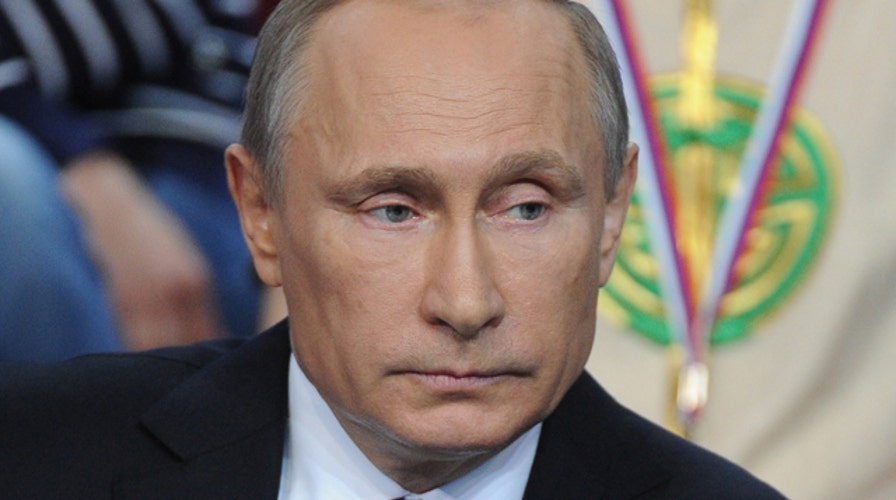Leaders of the G-7 announced late Friday they had agreed to "move swiftly" to impose new sanctions against Russia over its continued role in the unrest in Ukraine.
A statement released by the White House said the leaders of Canada, France, Germany, Italy, Japan, the United Kingdom, the United States, the President of the European Council and the President of the European Commission "have now agreed that we will move swiftly to impose additional sanctions on Russia.
"Given the urgency of securing the opportunity for a successful and peaceful democratic vote next month in Ukraine's presidential elections, we have committed to act urgently to intensify targeted sanctions and measures to increase the costs of Russia's actions."
While not addressing any specific actions, the statement said, "We reiterate our strong condemnation of Russia's illegal attempt to annex Crimea and Sevastopol, which we do not recognize. We will now follow through on the full legal and practical consequences of this illegal annexation, including but not limited to the economic, trade and financial areas."
Earlier Friday, Fox News confirmed new sanctions were expected to be announced Monday against Russian entities and individuals.
The G-7 statement follows Secretary of State John Kerry’s blunt charge Thursday night that Russia was not abiding by last week’s Geneva agreement to de-escalate the crisis in Ukraine, and his warning "if Russia continues in this direction, it will be not just a grave mistake, it will be an expensive mistake."
Earlier Reuters, quoting unidentified sources, said the European Union was expected to impose fresh sanctions at the same time and would name 15 previously unidentified individuals, focusing on those believed responsible for the Ukraine unrest. The sources said the U.S. list was expected to include “cronies” of Russian President Vladimir Putin.
Kerry laid the groundwork for more sanctions in his remarks Thursday, saying unless Russia changes course, "the world will make sure costs for Russia will only grow."
One week after Geneva, he said, Russia “has refused to take a single step in the right direction.”
A senior Obama administration official told The Associated Press that each country in the G-7 would determine their own sanctions. While the sanctions will be coordinated, they will not necessarily be identical, according to the official, who was not authorized to discuss the matter publicly and insisted on anonymity.
The White House released the G-7 statement hours after Obama convened a conference call with European leaders to gauge their commitment to additional sanctions.
Tensions were heightened on the ground, with Russian fighter jets reported crossing into Ukrainian airspace and a team of unarmed foreign military observers detained by pro-Russian forces in Slovyansk, the heart of the separatist movement in the east.
In another worrying development, a group of foreign military observers traveling under the auspices of the Organization of Security and Cooperation in Europe were detained by pro-Russia separatists in Slovyansk.
The German-led team was accused of possessing "suspicious materials," said Stella Khorosheva, a spokeswoman for the town's self-proclaimed separatist mayor. She said they were unharmed and would be released after further investigation.
Germany's Defense Ministry said it had lost contact with the team, which it said was made up of 13 people — five Ukrainians, three German soldiers, a German translator and one soldier each from the Czech Republic, Poland, Sweden and Denmark.
With last week's Geneva agreement calling on all illegal armed groups to lay down their weapons and hand over occupied cities and facilities in tatters, both sides exchanged threats and warnings Friday.
Accusing the West of plotting to control Ukraine, Russian Foreign Minister Sergey Lavrov declared that pro-Russia insurgents in the country's east would only disarm and leave the territory they have occupied if the Ukrainian government clears out a protest camp in Kiev's Independence Square, known as the Maidan, and evicts activists from other occupied facilities.
"The West wants -- and this is how it all began -- to seize control of Ukraine because of their own political ambitions, not in the interests of the Ukrainian people," Lavrov said.
Pro-Russia insurgents will disarm and vacate buildings "only if Kiev authorities get down to implementing the Geneva accords, clear out that shameful Maidan and liberate the buildings that have been illegally seized," the Russian foreign minister said.
Ukraine's reaction was swift.
"The world has not yet forgotten World War II, but Russia is already keen on starting World War III," Ukraine's acting prime minister, Arseniy Yatsenyuk told a meeting of his Cabinet.
At the United Nations, Ukraine's deputy foreign minister, Danylo Lubkivsky said he feared an imminent Russian invasion.
"We have the information we are in danger," Lubkivsky told reporters, saying Russian military maneuvers involving air and ground forces along the Ukraine border were a "very dangerous development."
"We are going to protect our motherland against any invasion," Lubkivsky said. "We call on the Russians to stop this madness."
The heightened rhetoric came as U.S. officials reported that Russian fighter jets flew into Ukrainian airspace several times over the last 24 hours, in what one called a provocation.
The Associated Press contributed to this report.





